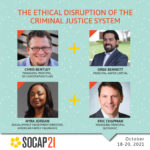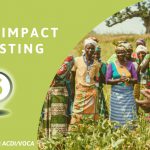“We made big bets, experimented early and often, made failure matter, reached beyond our bubble, and let urgency conquer our fear.”
If there’s one thing that we know about philanthropist, investor, and trailblazer Jean Case, it’s that she is fearless. She built a career as a technology executive spanning nearly two decades before she and her husband, Steve Case, created the Case Foundation in 1997. With Jean at the helm, the foundation focuses on creating programs and investing in people and organizations that harness the best impulses of entrepreneurship, innovation, technology, and collaboration to address urgent social challenges. We had the chance to sit down with this visionary to discuss everything from failure to the evolution of the impact investing movement.
What is your personal definition of impact investing and what do you wish everyone knew about impact investing?
Jean Case: For too long, businesses – especially entrepreneurs – have been left on the sideline when it comes to addressing big social challenges. Impact investing is one big way to change that. We define impact investments as investments into companies, organizations, and funds seeking to generate both social and financial returns. Steve and I have long considered social impact when making investments – we prefer investing in companies where we believe in the mission and the potential ability to solve problems and change the world. It’s early days, but there is no doubt that there is growing momentum in the impact investing sector. An ecosystem is filling out with more data available to help guide interested investors. This past year, the Case Foundation introduced a Short Guide to Impact Investing (shortguide.org) as a tool for those getting started.
What trends are you seeing in the impact investing world?
JC: We have seen some significant signals that the impact investing market is taking off. New investors, some of whom were even previously naysayers of the impact investing space, are jumping into the game. In the past 12 months alone, Bain Capital announced that it will launch a new impact investing focused group headed by former Massachusetts governor Deval Patrick; BlackRock announced the launch of BlackRock Impact, a business unit dedicated to impact investing; Etsy, a B Corp, debuted its IPO; and world-class, savvy investors like Bill Gates invested in impact-driven companies like Change.org (a B Corp) and the Unitus Seed Fund, while Marc Andreessen invested in AltSchool, which is also a B Corp.
Are there any innovations or new tools in the investing world that show promise for creating more impact?
JC: In addition to companies that are attacking big social challenges, I believe the momentum for impact investing will increase in areas like social impact bonds (SIBs) . These financing tools put a heavy focus on measurement and outcomes, which will have a spillover effect to make programs more effective. For too long, public funding has been extended toward programs that show little efficacy or impact in areas they target. And yet, year after year, these programs continue to get funded. The SIBs model appeals to taxpayers, governments, philanthropists, and the private sector because it represents a unique partnership model that infuses private sector resources to fund evidence-based interventions in areas ranging from education to healthcare to unemployment. These new models hold the potential to illuminate what works and what doesn’t and to optimize both delivery of service and tax dollars.
How do you identify the ideas or people who are changing the world and that you might want to invest in? What qualities do you look for when you’re investing in a company?
JC: As we approached our 15-year anniversary at the Case Foundation, we began to reflect on what made us, and our many partners, successful over the years. We found that we were most successful when we, and the organizations and entrepreneurs we invested in, were fearless. We made big bets, experimented early and often, made failure matter, reached beyond our bubble, and let urgency conquer our fear. Together these principles form a powerful way of thinking about effective philanthropy and change-making – one that we think will be important in meeting the challenges that confront us for generations to come.
Women are loaned $1 for every $23 loaned to a man – how can we go about changing this?
JC: Raising capital from investors has long been key to women’s economic development – from Africa to Silicon Valley. Yet the percentage of venture capital going to women-led businesses is just 13 percent. This number must grow. As investors, we have to break into the cycle and invest in women. Women’s empowerment is front and center this year as more companies and countries are fast-tracking initiatives to invest in female entrepreneurs. They recognize that women are crucial to economic growth around the world. We know that women-led high-tech startups are more capital-efficient, achieving 35 percent higher returns on investment. And when venture-backed, they generate 12 percent higher revenue than male-owned tech companies. At the Case Foundation, we have proactively taken strides to invest in women and support female entrepreneurs, from our support through grants to entities like the Startup America Partnership (now UP Global) and by funding leading female social entrepreneurs like Barbara Van Dahlen of Give an Hour, Barbara Bush of the Global Health Corps, and Reshma Saujani of Girls Who Code.
One of the things that holds many entrepreneurs back is fear. The Case Foundation espouses a fearless approach to social change. What do you recommend to people who have big ideas, but who are being held back by fear?
JC: The Be Fearless platform is really about a set of principles that, when applied, often lead to success when building companies or movements. It’s important that those out to change the world with a big idea understand that to find new ways to solve old problems, we need to try new things. Trying new things, or innovating, involves risk-taking and the potential for failure. If you look at successful entrepreneurs and innovators, you’ll see a road strewn with failures on their way to a breakthrough. The same is true in the work of social innovation. As a sector, we need to recognize this, and if failure happens, commit to fail fast and “fail forward” so there is future value in what didn’t work.
Can you tell us about a few businesses that you see as especially remarkable or innovative?
JC: I am especially inspired by the work of Revolution Foods and its co-founders Kristin Groos Richmond and Kirsten Saenz Tobey. They had a vision to dramatically increase access to healthy and delicious meals for children in schools across the country. Today, they serve more than 1 million “chef-inspired, kid friendly” healthy meals each week in cities across the US. Shazi Visram and Jessica Rolph of Happy Family are two social entrepreneurs who sought to make nutrient-rich baby food that was widely available and affordable. They have provided more than 5 million meals for children in need through partnerships with organizations like FEED and Project Peanut Butter, an organization that helps feed children in Africa. And Chuck Slaughter of Living Goods, a company that empowers micro-entrepreneurs to deliver life-changing products, like mosquito curtains and AFRIpads , to the doorsteps of the developing world. These founders have disrupted industries and made markets for social good.
What is inspiring you right now or giving you hope for the future?
JC: Today there are more than 1,500 fully certified B Corps in 39 countries across the world, yet more than 15,000 companies use their impact tools. This seems to suggest that there are tremendous possibilities to expand the tent for companies who want to measure social impact as a core part of how they manage and measure their success. I look forward to witnessing the growth of the B Corps movement and the new breed of entrepreneurs and social enterprises out to change the world.
Your organization is very transparent about both successes and failures. Has it ever been difficult to share those failures? Can you tell us what you’ve learned from failure, either professionally or personally, that has served you well in your career?
JC: It’s never easy to talk about failure, but it’s important to have that conversation. In 2012, I wrote “The Painful Acknowledgement of Coming Up Short,” which admitted the large failures we had with a high-profile clean water initiative in sub-Saharan Africa that we helped lead. It was hard to admit our failure, but we found that people embraced our transparency and were eager to share their own stories. Since that time, when we publish findings from programs or initiatives we undertake, we try to make sure we talk about what didn’t work, as well as what did. I don’t know many companies, movements, or causes that can claim 100 percent success at every single thing they attempt. We need the same honest recognition in the social sector so we don’t shy away from trying new, innovative approaches out of fear they might not work.
The world’s needs are great and they are urgent. Martin Luther King Jr. talked about “the fierce urgency of now” as he looked at a hurting world. For those bold innovators out there who want to bring new ideas to our communities, our nation, or the world, but sometimes can feel daunted by the fear of failure, I would point them to the last principle in our Be Fearless work: “Let urgency conquer fear.”
1 Know what is at the heart of what you are trying to achieve. We like to ask, “What problem are you trying to solve?” Companies who succeed at building a great business that has big impact generally find that being excellent in their core products and services builds the scale and sustainability for maximum social impact over time.
2 Choose partners and investors who are in lockstep with your company’s social mission, so that when tensions arise, everyone has the same value set against which decisions are made.
3 Develop a solid business model that can allow you to scale and sustain your business. If your business model ensures that as the company grows, so too does the impact, you’re on the right track.



